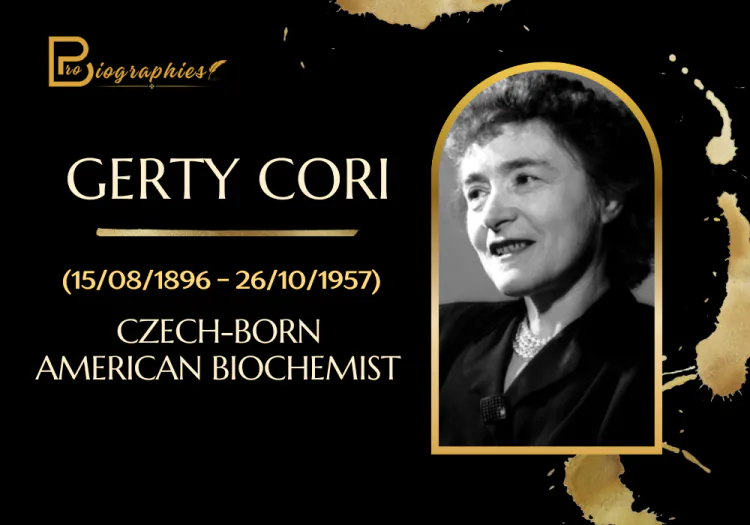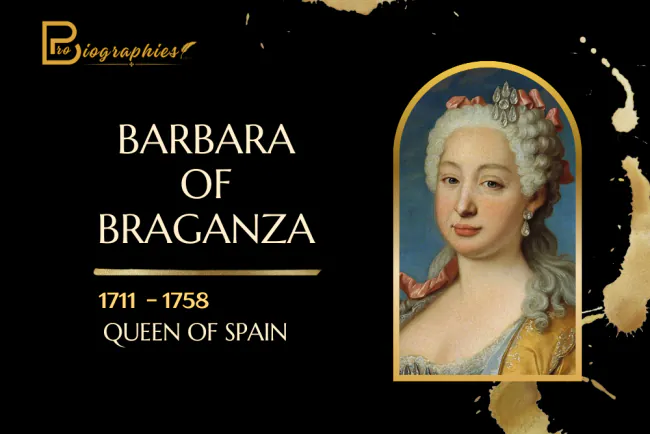Gerty Cori Biography
Czech-born American biochemist & the first woman to receive the Nobel Prize in Physiology or Medicine.

| Name | Gerty Theresa Radnitz |
| Parents | Otto Radnitz and Martha Radnitz |
| Known for | Cori cycle and carbohydrate metabolism |
| Nationality | Austro-Hungarian and American |
| Spouse | Carl Ferdinand Cori |
| Children | Thomas |
| Nombe | Gerty Theresa Radnitz |
Gerty Cori was born on August 15, 1896 in Prague, then part of the Austro-Hungarian Empire.
Family and Early Years:
She grew up in an upper-middle-class Jewish family. Her father, Otto Radnitz, worked as a chemist and was employed as a superintendent of a sugar factory. His mother, Martha Radnitz, was an educated woman who had contacts with great Czech artists like Franz Kafka and she advised her kids to learn hard in school. Gerty had two younger brothers who were also given good education. This is what made her like science through her father.
Training and Marriage:
After finishing high school at a girls’ institution, she joined the German University of Prague where she decided to pursue medicine, obtaining her degree in 1920. It was during this period that she met Carl Cori, who also loved biochemistry just like herself. They both graduated alongside each other before later tying the knot forming a couple that would be key players in the development of biochemistry.
Start of Career:
The Coris continued their work on carbohydrate metabolism by carrying out researches in various hospitals and laboratories located within Vienna. Their first significant works were done jointly about glycogen conversion into lactic acid in muscle cells as well as its restoration from liver which eventually became known as Cori Cycle for that matter.
Immigration into America:
They first emigrated to the US in 1922, where they lived in Buffalo, New York and found work at the state university of new york school of medicine. Over a duration of three decades from The 1930s through to the 1940s, Gerty Cori carried out research on enzyme regulation as well as metabolic processes.
Awards and honors:
The Nobel Prize in physiology or medicine was awarded to Gerty and Carl along with Bernardo Houssay, an argentine physiologist for their pioneering work concerning glycogen breakdown mechanism which is also known as catalytic degradation of glycogen, thus becoming an American woman who won a Nobel prize for science and particularly for Physiology or Medicine after Marie Curie; this was third in any scientific field after those of Irène Joliot-Curie’s category.
She became a member of the American Academy of Arts and Sciences in 1953 (the first woman to be elected would be her) and she was also made a member of the National Academy of Sciences albeit posthumously. She continued being on the board of directors for national science foundation by appointment from President Truman until her death. Among other societies, Gerty belonged to such scientific associations as American Society Biological Chemists, American Chemical Society, and American Philosophical Society.
Awards and Honors with Her Husband:
They were recipients of Midwest Prize in 1946 and Squibb Prize for Endocrinology two years later. Washington University Laboratory where both worked has been designated as National Historic Landmark since 2004. Six students who studied under her have won Nobel Prizes.
Legacy and Memorials:
These include Cori Crater on Venus’ surface, a crater named after her on Moon’s landscape (the Cori “),” sharing a star with his husband at Saint Louis Walk of Fame and inducted into National Women’s Hall of Fame in 1998. A United States postage stamp was issued to honor her in 2008.
Private life:
Grety and Carl Cori had a son, Tom Cori, who became an engineer. She was a reserved but tenacious woman known for her love of books, classical music and nature.
Death:
Gerty Cori died from myelosclerosis on October 26th, 1957 at St. Louis in Missouri. Her death was a great blow to the scientific world but she continued with her research work and training of future scientists.
Legacy:
She is known for being one of the pioneers in biochemistry and she has been a role model for many young women who want to study science; moreover, she initiated novel approaches towards studying carbohydrate metabolism that eventually resulted discovery treatment options for diseases caused by metabolic disorders.
Summary:
Czech-American biochemist known for early research into carbohydrate metabolism. As part of what is now called Cori’s cycle (the pathway between liver glycogen breakdown and glucose production via gluconeogenesis), this finding was made alongside Carl Cori. This earned her a Nobel Prize in Physiology or Medicine thereby becoming the first female laureate within this category (1947).
Did you know...
Carl and Gerty Cori were declared National Historic Landmarks In Chemistry by the American Chemical Society in 2004, honoring their achievements concerning carbohydrate metabolism.
What's Your Reaction?





























